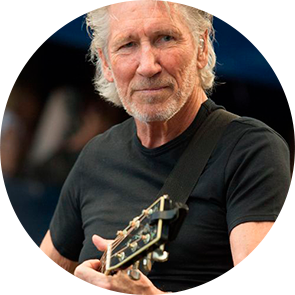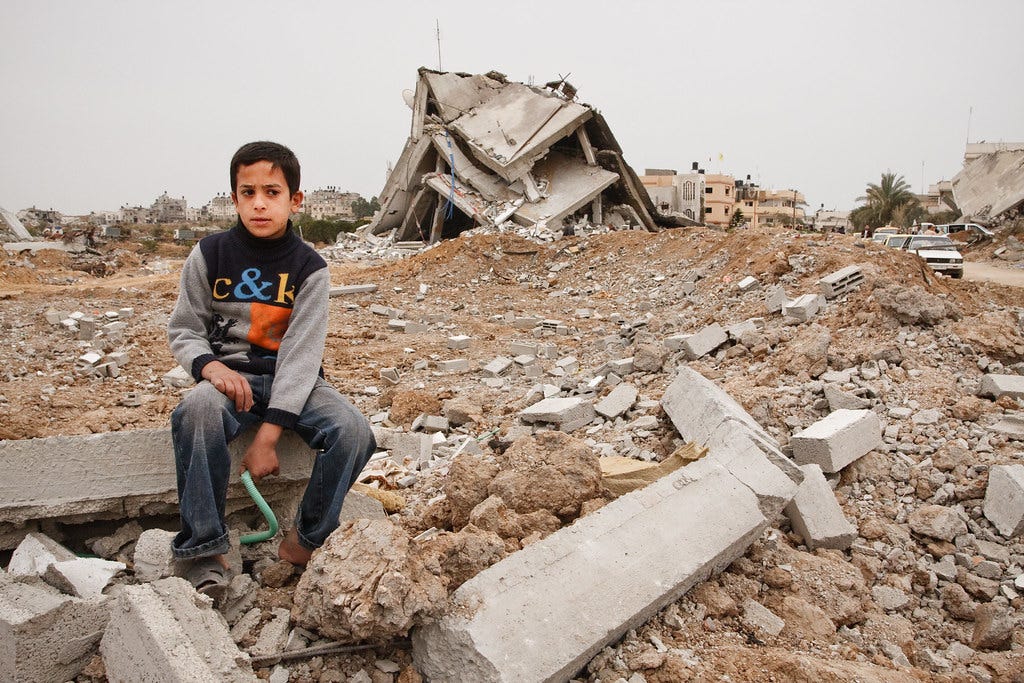UN World Children’s Day: On November 20th 1959 the UN General Assembly adopted the Declaration of the Rights of the Child and on the same date in 1989 it adopted the Convention on the Rights of the Child. In 1991 Israel ratified the Convention which stipulates all children have the fundamental rights to life, survival, protection from violence and an education that enables them to fulfil their potential.
Roger Waters revealed the piece last month speaking to Mark Seddon live on Palestine Deep Dive, “This is an op-ed piece that I wrote to Rolling Stone in 2017 that they didn’t print because they said ‘we’ve heard enough from you about Palestine’… there she is, bless her… Iman Al Hams she was 13-years-old when she was shot dead by an Israeli sniper safe in his armour in his guard post…” Watch the full episode now on YouTube.
ROGER WATERS: “Freedom of speech, human rights, the law, and the US constitution.”
Bored yet?
Ok, I’ll start again. Your sister is walking to school dressed in her school uniform when she is shot by a soldier at close range from an army observation post. The soldier’s superior officer, Captain R. (name protected), goes over to “confirm the kill”. He’s not quite sure she’s dead, so, he puts two rounds through her skull and empties the rest of his magazine into her dead body. It is October 5, 2004, your sister’s name is Iman Al Hams. She is thirteen years old. Not your sister? Here’s a photo of her. No? Are you sure?
“Not your sister? Here’s a photo of her. No? Are you sure?”
Under immense pressure from human rights activists, Captain R. is eventually charged, not with murder, but with conduct unbecoming an officer and two counts of illegal discharge of his weapon. He is cleared on all counts by a military court.
So, what does Iman Al Hams have to do with freedom of speech, human rights, the law, and the US constitution? Everything.
“Iman Al Ham’s basic right to life was denied by the illegal actions of the Israeli occupying army that killed her.”
Let’s start with human rights.
The idea that human beings have individual rights under the protection of a set of agreed upon laws is really quite new, so it is no surprise that there is some confusion as to what these rights might be and who might enjoy them. We could go back to as recently as the French and American Revolutions of the late 18th century, or we could delve further back to 13th century England and the Magna Carta, or ancient Greece and the beginnings of democracy. However far back we go, or whatever direction we look in, the arc towards achieving greater human rights bends towards securing protections for the individual – against tyrannies.
After the Second World War, the newly formed United Nations convened in Paris to draft a Universal Declaration of Human Rights, which was adopted in December 1948 and enshrined in international law. Also after World War 2, the UN adopted the Geneva Conventions as a legal guide to acceptable norms of behavior during war and also post-war behavior by an occupying army. The point of all of this is there does exist an almost universally agreed upon and accepted rule of law that provides protection to individuals – and also redress in the event of violations of these conventions and international laws.
Iman Al Ham’s basic right to life was denied by the illegal actions of the Israeli occupying army that killed her.
“Iman Al Hams is my sister. The way her short life was so summarily and callously ended has haunted me, her death is symbolic of the summary subjugation and ethnic cleansing of the Palestinian people perpetrated by the state of Israel over the last 70 years.”
Iman Al Hams is my sister. The way her short life was so summarily and callously ended has haunted me, her death is symbolic of the summary subjugation and ethnic cleansing of the Palestinian people perpetrated by the state of Israel over the last 70 years.
I protest Iman’s illegal killing and the illegal killing of thousands of other innocent Palestinian children. I stand alongside the parents and grieve with them, and the occupied people who not only have a legal right, but also a moral duty to resist the occupying military force which has been illegally confiscating and colonizing Palestinian land.
How should I make my protest? How should I express my pain, my grief, my rage at the taking of Iman, my beautiful young sister? Should I howl my loss into the sky, or smash my tearstained face into the riot shields, rip my heart out from my breast, with old man’s hands. Or should I fall broken to my knees and whimper, gazing blind through unseeing eyes swollen shut, defeated, uncomprehending in the face of acts so bestial and low? No, I have an alternative. The People of occupied Palestine have given me that alternative, to join them in nonviolent resistance.
Back in July 2005, Palestinian Civil Society made an historic call. Inspired by the example of Black South Africans struggling against apartheid and the US Civil Rights movement, they urged people of conscience around the world to support Boycott, Divestment, and Sanctions (BDS) in order to pressure Israel into respecting Palestinian rights and granting them their long-denied freedom.
The grassroots BDS movement for freedom, justice and equality was born. All over the world, people of conscience now had a rallying point.
“The grassroots BDS movement for freedom, justice and equality was born. All over the world, people of conscience now had a rallying point.”
Ok, now to ‘freedom of speech.’
In the US and elsewhere, BDS has steadily gained ground in the battle for hearts and minds. Companies and churches have divested tens of millions of dollars and thousands of academics and cultural figures have boycotted by refusing either to perform in or to accept awards from Israel. This has happened not only because the cause is just and the Palestinian struggle has truth on its side, but also because Israeli policy in Gaza and the rest of the occupied territories has become ever more barbaric and deadly. The callous slaughter of hundreds of Palestinian children during Israel’s bombing of tiny, besieged Gaza in 2008/9, 2012 and 2014 shocked the on-looking world, and now in 2017 the Israeli government is still routinely kidnapping, imprisoning, torturing and killing Palestinian children in the occupied territories and continuing to render life in the open air prison that is Gaza untenable by routinely cutting off the power and water supply, and blockading the border to prevent the import of medical and other essential supplies.
With growing outrage over these atrocities and the global embrace of BDS as a tactic, the Israeli government has become genuinely worried about a real shift in US public opinion, including amongst mainline church congregations and across the Jewish community where groups like Jewish Voices for Peace, who support BDS, are gaining significant ground.
“The fight is on. The gloves are off. The first amendment to the Constitution of the United States of America is under attack, and this is the most important part of this article: our right to freedom of speech is at serious risk.”
The fight is on. The gloves are off. The first amendment to the Constitution of the United States of America is under attack, and this is the most important part of this article: our right to freedom of speech is at serious risk. The Israeli government and its supporters in the USA are pushing members of congress to pass laws that suppress the voice of Americans who support BDS as a peaceful way to put pressure on Israel to return to the rule of law and abide by the Geneva conventions.
It was legal to boycott in Montgomery in the 1960s, legal to boycott Apartheid South Africa in the 1980s, legal for Bruce Springsteen and corporations to boycott North Carolina in support of LGBTQ rights, but a foreign government, through its US proxies like AIPAC, is exerting pressure on members of Congress and state politicians – elected officials in the land of the free – to deny fellow Americans their First Amendment right of free speech should they choose to support a boycott of Israel.
All we in BDS want is to stand peacefully in solidarity with our brothers and sisters in Palestine, and in Israel too, and encourage an end to the inhumane immoral and criminal barbarism that is Israel’s occupation, just as we have done generation after generation in the face of similar injustices.
In 21 states, bills have been passed to silence Americans who support boycotts and other economic acts of conscience. For example, in Texas an anti BDS bill that had been signed into law earlier this year, required those applying for a grant for Hurricane Harvey relief to sign a document promising never to boycott Israel. No promise, no grant! I myself, was threatened by Nassau county officials who attempted to shut down two of my shows there. Congress is considering a bill, the Israel anti-Boycott Act that threatens BDS supporters with up to 20 years in prison and $1 million fine.
The ACLU and other civil liberties groups have condemned anti-boycott legislation as a serious threat to the Constitutional right to free speech. In the first such legal challenge to these laws, the ACLU recently filed suit against the state of Kansas after Esther Koontz, a math teacher from Wichita, was denied employment in a training program because she, guided by her Mennonite church, is boycotting Israel over its human rights abuses.
It is clear the moral arc is slowly bending for Palestinians and all those people of conscience who wish to protect them from further harm. I do believe that as more and more of us stand up together for freedom, justice and equality, for all our brothers and sisters all over the world, regardless of their color, ethnicity, nationality or religion, we shall overcome someday.”
Roger Waters November 2017.
“PS. February 2018. The ACLU won the Ester Koontz case against the state of Kansas. Yayyy!
The Tide is Turning.
Love
R.”




